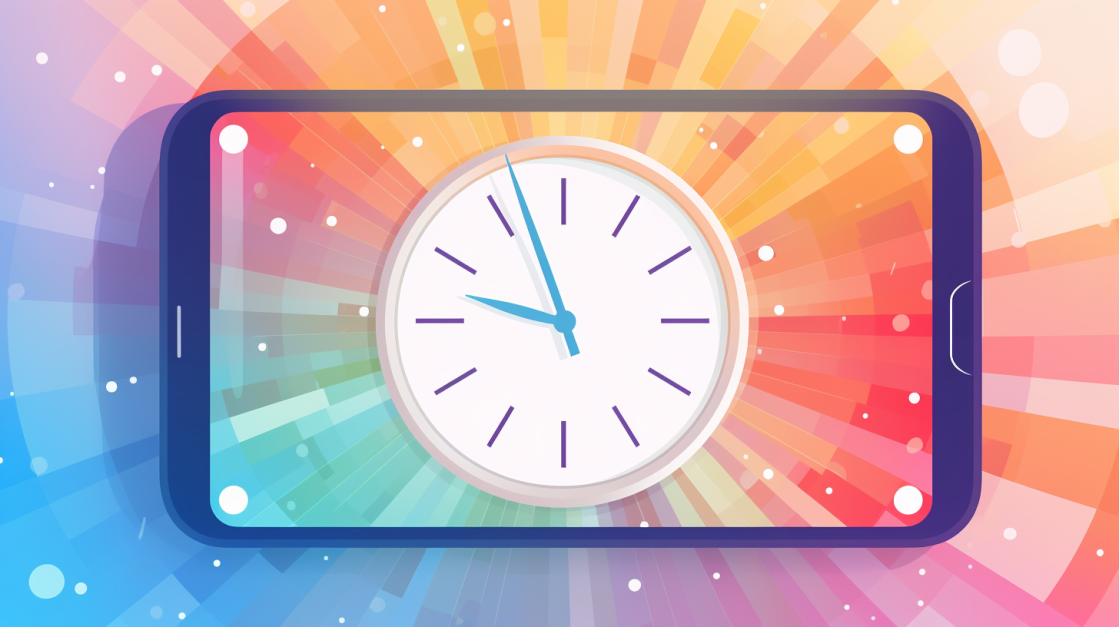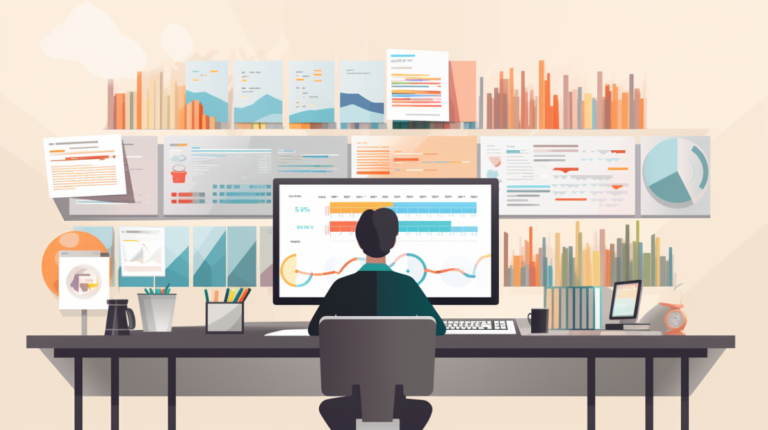Time Management For Work From Home

Are you battling to keep your work responsibilities in check while working from home? Trust me, you’re far from alone. With an estimated 87% hike in remote work since the dawn of 2020, this juggling act has become a common challenge for many.
Luckily for you, this blog is packed with tried and true strategies that can catapult your productivity and master time management – skills nurtured through my years of remote work experience and extensive research on the topic.
So stick around; let’s dive into the realm of effective time management together, one task at a time!
Key Takeaways
- Establishing a routine, prioritizing tasks, and managing distractions are crucial for effective time management while working from home.
- Creating a designated workspace helps separate work from personal life and reduces distractions.
- Setting clear boundaries with family members or roommates is important to avoid interruptions during work hours.
- Using time – tracking software can help remote workers identify how they spend their time and optimize productivity.
The Importance of Time Management for Remote Work
Time management is key in remote work. It helps me get my work done faster and better. I set clear start and end times for each task to keep things in check. This helps me stay focused on my job, leaving no room for time waste.
Good time management improves the quality of our tasks at hand. It also makes us more responsible for our duties. Having a plan for the day stops us from wasting time on less useful stuff.
We focus more on important jobs which makes our work shine brighter. In brief, managing time well means doing great in remote work!
Challenges in Managing Time While Working from Home

Managing time while working from home can be challenging due to the lack of structure, numerous distractions at home, the temptation to overwork or underperform, and the decreased sense of accountability.
Lack of Structure
Working from home can be hard without a plan. A clear structure lets you manage your time well and get more done. Without it, you lose focus and end up wasting time.
A set workday schedule is like a road map for the day. It tells me where I need to go and how much time I have to get there. When my day has no shape, tasks take longer than they should.
Work bleeds into personal time as boundaries blur and overworking becomes common.
To avoid this, I plan my day before it starts. This way, I know what needs to get done and when.
Distractions at Home
Home distractions can hurt work. You might have to deal with loud sounds, kids running around, or pets seeking attention. It’s hard to focus on tasks in this chaos. Cutting down social media use also helps as it is a big time stealer.
Creating a quiet space for work is useful in this case. By doing so, you can get your mind into ‘work mode’ and keep away from these distractions. Turning off phone alerts during work hours stops constant interruptions too.
This setup helps increase efficiency and keeps focus sharp.
Overworking
Work from home can blur the line between job and rest. It is easy for me to overwork. More hours of work do not mean more tasks done. Overworking makes me tired and hurts my brain.
Then, I do less work in more time. I make many mistakes too. To stop this, I need to set clear work times and stick to them. Even at home, end of day means stop working! This helps me stay fresh and sharp for a new day’s tasks tomorrow.
Underperforming
Underperforming can be a common challenge when working from home. Without proper time management, it’s easy to get distracted and lose focus, which can result in decreased productivity and quality of work.
However, by implementing effective time management strategies, such as setting clear boundaries, creating a structured routine, and prioritizing tasks, it is possible to address underperformance and improve overall productivity.
Allocating sufficient time for each task ensures that they are completed thoroughly and helps maintain high-quality work standards. By taking control of your time and staying organized, you can overcome underperformance challenges while working remotely.
Less Accountability
Working from home can sometimes lead to less accountability when it comes to managing our time effectively. Without the structure and oversight of a traditional office environment, it’s easy to fall into bad habits and lose track of our tasks and deadlines.
We may not have someone checking in on us or holding us accountable for our work. As a result, we might find ourselves procrastinating, getting distracted by personal responsibilities or household chores, or even working longer hours than necessary without realizing it.
It’s important for remote workers to be proactive in establishing their own systems of accountability to stay on track and maintain productivity. By setting clear goals and deadlines for ourselves, using time management tools or apps that help track our progress, and regularly checking in with colleagues or supervisors, we can ensure that we stay accountable and meet our work responsibilities while working from home.
Practical Tips for Effective Time Management

To effectively manage your time while working from home, it is important to establish a routine, prioritize tasks, manage distractions, use time-tracking software, create a dedicated workspace, set clear boundaries, schedule regular breaks, stay connected with your team, avoid multitasking and embrace the Pomodoro Technique.
Establishing a Routine
To effectively manage my time while working from home, I need to establish a routine. Here’s how I can do that:
- Wake up at the same time every day.
- Get dressed for work. as it helps me mentally prepare for the day.
- Start my workday at a set time, just like I would if I were going into the office.
- Plan out my tasks and goals for the day in advance.
- Take regular breaks.to recharge and avoid burnout.
- Designate specific times for meals and snacks.to stay fueled throughout the day.
- Set boundaries with family members or roommates. making it clear when I am working and should not be disturbed.
- Create a consistent end-of-work routine.to signal the transition from work mode to personal time.
Prioritizing Tasks
When working remotely, prioritizing tasks is crucial for effective time management. Here are some key tips to help prioritize your tasks:
- Identify important and urgent tasks: Determine which tasks require immediate attention and focus on those first.
- Use the Eisenhower Matrix: Categorize your tasks into four quadrants based on their importance and urgency – Do First (important and urgent), Schedule (important but not urgent), Delegate (not important but urgent), Eliminate (not important or urgent).
- Set SMART goals: Make sure your goals are Specific, Measurable, Achievable, Relevant, and Time-bound. This will help you stay focused on what truly matters.
- Break down larger tasks: If you have complex projects or tasks, break them down into smaller steps to make them more manageable and less overwhelming.
- Consider deadlines: Take note of any deadlines associated with your tasks and prioritize accordingly.
- Evaluate potential impact: Assess the potential impact each task can have on your overall goals or desired outcomes. Prioritize those that will bring the most value or contribute directly to your objectives.
- Follow the 80-20 rule: Focus on completing 20% of your tasks that will yield 80% of the results. This helps maximize productivity and effectiveness.
- Seek feedback from stakeholders: If you’re unsure about task prioritization, consult with relevant team members or stakeholders to ensure alignment and clarity.
Managing Distractions
Distractions can make it challenging to stay focused and productive while working from home. Here are some practical tips for managing distractions:
- Create a designated workspace: Having a dedicated area for work helps establish boundaries and minimize interruptions from household activities.
- Minimize background noise: Find a quiet space or consider using noise-canceling headphones to block out any distractions.
- Turn off notifications: Silence your phone and disable pop-up notifications on your computer to avoid getting distracted by social media or email alerts.
- Set clear boundaries with family and roommates: Communicate your work schedule and let them know when you need uninterrupted time to focus on your tasks.
- Use productivity tools: Utilize apps or browser extensions that block certain websites or limit the amount of time spent on non-work-related activities.
- Take regular breaks: Scheduled breaks can help refresh your mind and prevent burnout, reducing the tendency to get easily distracted.
- Prioritize tasks: Identify the most important tasks that require your attention and tackle them first, so you’re less likely to be pulled away by less urgent matters.
- Practice self-discipline: Stay committed to staying on track and avoiding distractions by setting personal goals and holding yourself accountable.
Using Time-Tracking Software
Time-tracking software is a helpful tool for remote workers to stay focused and accountable. It gives us a clear picture of how we spend our time during work hours. By understanding where our time goes, we can optimize productivity and prioritize tasks more effectively.
Time-tracking software provides detailed reports on how much time we spend on different activities, helping us identify areas for improvement and make adjustments to our work habits.
With this information, we can set realistic goals, manage our time more efficiently, and ultimately increase our productivity while working from home.
Creating a Dedicated Workspace

Having a dedicated workspace is essential for remote workers. It provides a designated area specifically for work, helping to separate it from your personal life. This space can be as simple as a desk in a quiet corner of your home or a spare room transformed into an office.
By creating this dedicated workspace, you signal to yourself and others that when you’re in that space, you’re focused on work. It helps establish boundaries and reduces distractions, allowing you to concentrate better and be more productive.
So find a spot in your home where you can set up your own dedicated workspace and make it conducive to getting work done efficiently.
Setting Clear Boundaries
Setting clear boundaries is important for effective time management when working from home. Here are some strategies to help establish those boundaries:
- Create a designated workspace: Designate a specific area in your home for work-related tasks. This will help you mentally separate your work life from your personal life.
- Establish set working hours: Determine a start and end time for your workday, and stick to it. Communicate these hours with others in your household so they know when you shouldn’t be disturbed.
- Limit distractions: Minimize interruptions by turning off notifications, closing unnecessary tabs on your computer, and putting your phone on silent mode during work hours.
- Communicate with family members: Let your family members know when you are working and ask them to respect your boundaries during those times.
- Take regular breaks: Schedule short breaks throughout the day to rest and recharge. Use this time to step away from your workspace and engage in activities that relax you.
Scheduling Regular Breaks
Taking regular breaks throughout the workday is crucial for maintaining focus and productivity. Here are some tips to help you effectively schedule and take breaks:
- Plan short breaks: Take short breaks of 5-10 minutes every hour or two to rest your mind and stretch your body.
- Move around: During your breaks, move away from your workspace and engage in light physical activity, such as walking or stretching.
- Disconnect from screens: Use your break time to step away from electronic devices and give your eyes a break by looking at something that is not a screen.
- Hydrate and refuel: Use your breaks to drink water and have a healthy snack to keep yourself energized throughout the day.
- Take longer breaks: In addition to short breaks, schedule longer breaks of 15-30 minutes every few hours to recharge and relax.
- Engage in enjoyable activities: Use your longer breaks to do something you enjoy, such as reading a book, listening to music, or practicing a hobby.
- Avoid multitasking during breaks: It’s important to fully disconnect from work tasks during your breaks and give yourself time for mental relaxation.
Staying Connected with Your Team
Staying connected with your team is really important when you work from home. It helps to minimize distractions and keep the workflow smooth. By staying in touch, you can communicate effectively, collaborate on projects, and stay updated on any changes or deadlines.
Regular check-ins through video calls or messaging platforms like Slack can help maintain a sense of connection and accountability within the team. Sharing progress updates and discussing any challenges or roadblocks can also lead to better problem-solving and efficiency.
So, make it a priority to stay connected with your team even when working remotely.
Avoiding Multitasking
Avoiding multitasking is essential for effective time management while working from home. Multitasking may seem like a way to get more done, but it actually decreases productivity.
When we try to focus on multiple tasks at once, our attention becomes divided, leading to errors and inefficiencies. Instead of juggling multiple tasks simultaneously, it’s better to focus on one task at a time.
By giving our full attention and effort to each task, we can complete them more efficiently and produce higher-quality work. So, when working from home, it’s important to resist the urge to multitask and prioritize focusing on one task before moving on to the next.
Embracing the Pomodoro Technique
I find the Pomodoro Technique to be a valuable time management strategy for remote work. This technique involves breaking your work into short, focused intervals called “Pomodoros” (typically 25 minutes) with short breaks in between (around 5 minutes).
After completing four consecutive Pomodoros, you can take a longer break (around 15-30 minutes). The idea behind this technique is to work in concentrated bursts and give yourself regular breaks to rest and recharge.
By using a timer or an app like Time Doctor, you can track your Pomodoros and stay accountable. This method helps improve productivity by increasing focus, reducing distractions, and preventing burnout.
Benefits of Good Time Management for Remote Work

Good time management skills bring several benefits to remote work. Firstly, it increases productivity and efficiency. When we manage our time effectively, we can stay focused on our tasks and complete them more quickly.
This allows us to accomplish more in less time, which is important for meeting deadlines and achieving goals.
Secondly, good time management reduces distractions. By planning our day and setting boundaries, we can minimize interruptions from family members or household chores. This helps us maintain concentration and stay on track with our work.
Thirdly, effective time management improves accountability. When we have a clear plan for the day and set specific goals or targets, it becomes easier to hold ourselves accountable for completing those tasks.
It ensures that important work is not overlooked or delayed.
Furthermore, allocating enough time for tasks enhances the quality of our work. Rushing through assignments often leads to mistakes or subpar results. However, by managing our time well and allowing sufficient time for each task or project, we can produce higher-quality output.
Lastly, good time management provides a sense of control and reduces stress. When we have a structured schedule with clear priorities and deadlines, it alleviates the feeling of being overwhelmed by workload.
This promotes better work-life balance and overall well-being.
In summary, incorporating strong time management skills into remote work brings numerous benefits such as increased productivity, reduced distractions, improved accountability,
higher-quality output,and decreased stress levels
Frequently Asked Questions
– How can I structure my day while working from home?
– What are the 4 Ds of time management?
– How can I improve my time management skills?
How to structure your day working from home?
To structure your day working from home, it’s important to create a routine that includes designated work hours and breaks. Start by establishing a clear start and end time for your workday, just like you would in an office.
This helps set boundaries and ensures that you maintain a healthy work-life balance. Designate a specific workspace where you can focus on your tasks without distractions from household chores or family members.
Get dressed as if you were going into the office to help create a professional mindset. Take regular breaks throughout the day to recharge and avoid burnout. Stick to your schedule as much as possible and prioritize tasks based on their importance and deadlines.
What are the 4 Ds of time management?
The 4 Ds of time management are Delete, Delegate, Defer, and Do. Delete means getting rid of tasks or activities that are not important or helpful. Delegate involves giving tasks to others or asking for help to lighten your workload.
Defer is about postponing tasks that can be done later when they’re less urgent or important. And finally, Do is the action step where you actually complete the tasks in a timely manner.
Remember these Ds to better manage your time and be more productive!
How can I improve my time management skills?
To improve time management skills, I suggest the following strategies:
1. Set clear goals: By setting specific and realistic goals, you can prioritize tasks and allocate your time more effectively.
2. Create a schedule: Establishing a daily or weekly schedule helps create structure and ensures that essential tasks are completed on time.
3. Minimize distractions: Identify potential distractions in your work environment and find ways to eliminate or minimize them. This could include turning off notifications on your phone or using website blockers to limit access to social media during work hours.
4. Prioritize tasks: Determine which tasks are most important and tackle those first. This approach ensures that critical work gets done before moving on to less urgent tasks.
5. Break down larger tasks: Sometimes large projects seem overwhelming, causing procrastination or inefficiency. Breaking them down into smaller, manageable steps makes them easier to complete and reduces stress.
How Can Parents Better Manage Their Time While Working From Home?
Work from home jobs for parents can be a great way to balance work and family life. To better manage their time, parents should set clear boundaries, establish a schedule, and communicate with their employers about their availability. Prioritizing tasks, minimizing distractions, and delegating responsibilities can also help parents efficiently navigate their professional and parental responsibilities.
Conclusion
In conclusion, effective time management is essential for remote work success. By establishing a routine, prioritizing tasks, managing distractions, and using tools like time tracking software, remote workers can improve productivity and maintain a healthy work-life balance.
With the right strategies in place, working from home can be just as efficient and rewarding as working in an office setting. So take control of your time and set yourself up for success!






